Jinhui Hu
Robust distributed extended Kalman filter based on adaptive multi-kernel mixture maximum correntropy for non-Gaussian systems
Jan 17, 2026Abstract:As one of the most advanced variants in the correntropy family, the multi-kernel correntropy criterion demonstrates superior accuracy in handling non-Gaussian noise, particularly with multimodal distributions. However, current approaches suffer from key limitations-namely, reliance on a single type of sensitive Gaussian kernel and the manual selection of free parameters. To address these issues and further boost robustness, this paper introduces the concept of multi-kernel mixture correntropy (MKMC), along with its key properties. MKMC employs a flexible kernel function composed of a mixture of two Students t-Cauchy functions with adjustable (non-zero) means. Building on this criterion within multi-sensor networks, we propose a robust distributed extended Kalman filter-AMKMMC-RDEKF based on adaptive multi-kernel mixture maximum correntropy. To reduce communication overhead, a consensus averaging strategy is incorporated. Furthermore, an adaptive mechanism is introduced to mitigate the impact of manually tuned free parameters. At the same time, the computational complexity and convergence ability of the proposed algorithm are analyzed. The effectiveness of the proposed algorithm is validated through challenging scenarios involving power system and land vehicle state estimation.
Adaptive Robust Unscented Kalman Filter for Dynamic State Estimation of Power System
Apr 10, 2025Abstract:Non-Gaussian noise and the uncertainty of noise distribution are the common factors that reduce accuracy in dynamic state estimation of power systems (PS). In addition, the optimal value of the free coefficients in the unscented Kalman filter (UKF) based on information theoretic criteria is also an urgent problem. In this paper, a robust adaptive UKF (AUKF) under generalized minimum mixture error entropy with fiducial points (GMMEEF) over improve Snow Geese algorithm (ISGA) (ISGA-GMMEEF-AUKF) is proposed to overcome the above difficulties. The estimation process of the proposed algorithm is based on several key steps including augmented regression error model (AREM) construction, adaptive state estimation, and free coefficients optimization. Specifically, an AREM consisting of state prediction and measurement errors is established at the first step. Then, GMMEEF-AUKF is developed by solving the optimization problem based on GMMEEF, which uses a generalized Gaussian kernel combined with mixture correntropy to enhance the flexibility further and resolve the data problem with complex attributes and update the noise covariance matrix according to the AREM framework. Finally, the ISGA is designed to automatically calculate the optimal value of coefficients such as the shape coefficients of the kernel in the GMMEEF criterion, the coefficients selection sigma points in unscented transform, and the update coefficient of the noise covariance matrices fit with the PS model. Simulation results on the IEEE 14, 30, and 57-bus test systems in complex scenarios have confirmed that the proposed algorithm outperforms the MEEF-UKF and UKF by an average efficiency of 26% and 65%, respectively.
Diffusion Augmented Complex Maximum Total Correntropy Algorithm for Power System Frequency Estimation
Apr 10, 2025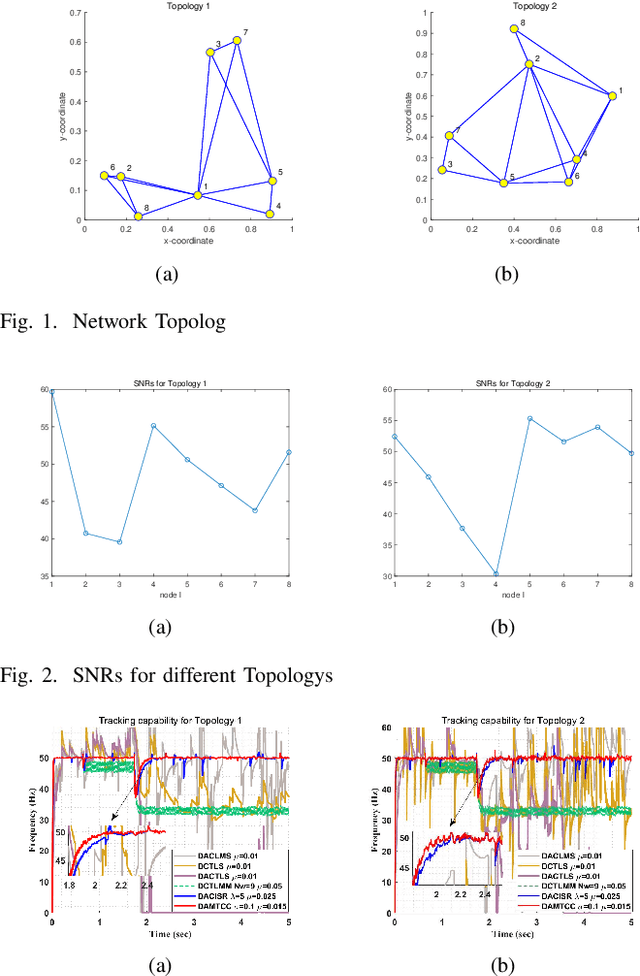
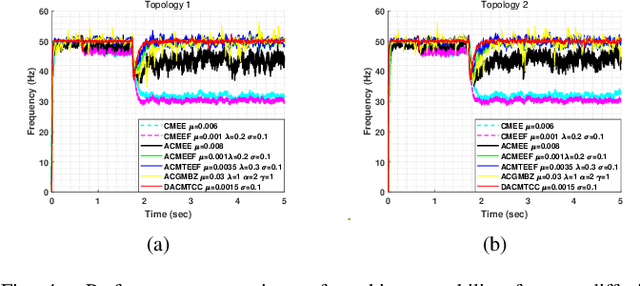
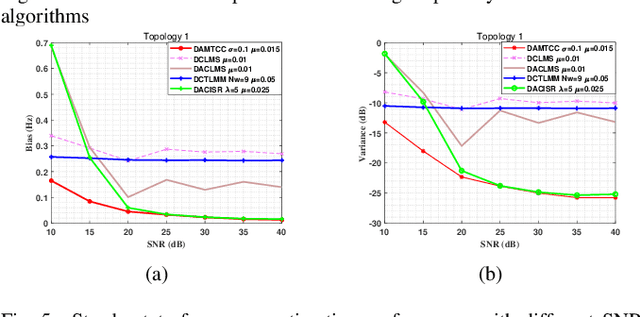
Abstract:Currently, adaptive filtering algorithms have been widely applied in frequency estimation for power systems. However, research on diffusion tasks remains insufficient. Existing diffusion adaptive frequency estimation algorithms exhibit certain limitations in handling input noise and lack robustness against impulsive noise. Moreover, traditional adaptive filtering algorithms designed based on the strictly-linear (SL) model fail to effectively address frequency estimation challenges in unbalanced three-phase power systems. To address these issues, this letter proposes an improved diffusion augmented complex maximum total correntropy (DAMTCC) algorithm based on the widely linear (WL) model. The proposed algorithm not only significantly enhances the capability to handle input noise but also demonstrates superior robustness to impulsive noise. Furthermore, it successfully resolves the critical challenge of frequency estimation in unbalanced three-phase power systems, offering an efficient and reliable solution for diffusion power system frequency estimation. Finally, we analyze the stability of the algorithm and computer simulations verify the excellent performance of the algorithm.
Robust Square Root Unscented Kalman filter of graph signals
Sep 11, 2024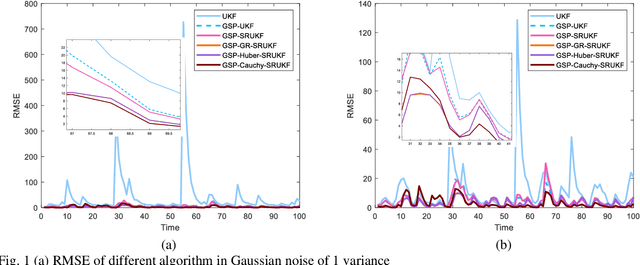
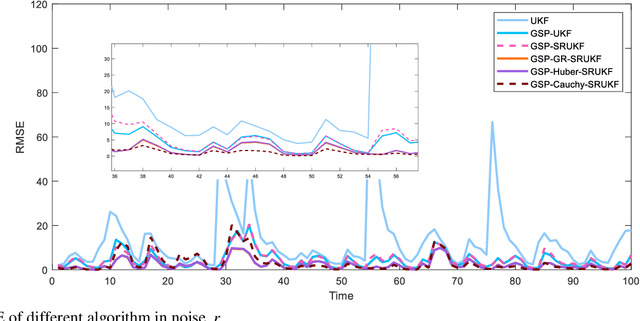
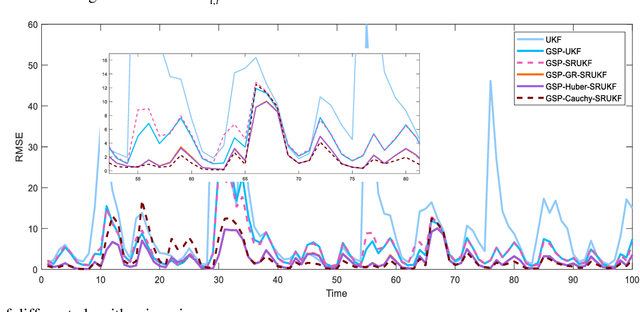
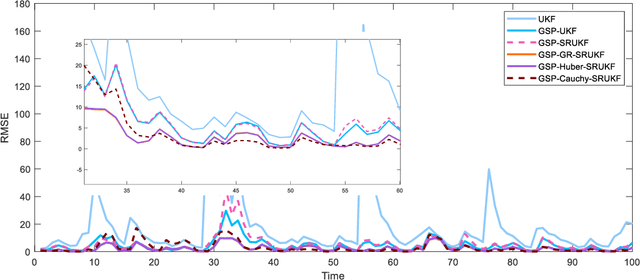
Abstract:Considering the problem of nonlinear and non-gaussian filtering of the graph signal, in this paper, a robust square root unscented Kalman filter based on graph signal processing is proposed. The algorithm uses a graph topology to generate measurements and an unscented transformation is used to obtain the priori state estimates. In addition, in order to enhance the numerical stability of the unscented Kalman filter, the algorithm combines the double square root decomposition method to update the covariance matrix in the graph frequency domain. Furthermore, to handle the non-Gaussian noise problem in the state estimation process, an error augmentation model is constructed in the graph frequency domain by unifying the measurement error and state error, which utilizes the Laplace matrix of the graph to effectively reduce the cumulative error at each vertex. Then the general robust cost function is adopted as the optimal criterion to deal with the error, which has more parameter options so that effectively suppresses the problems of random outliers and abnormal measurement values in the state estimation process. Finally, the convergence of the error of the proposed algorithm is firstly verified theoretically, and then the robustness of the proposed algorithm is verified by experimental simulation.
MIPI 2024 Challenge on Few-shot RAW Image Denoising: Methods and Results
Jun 11, 2024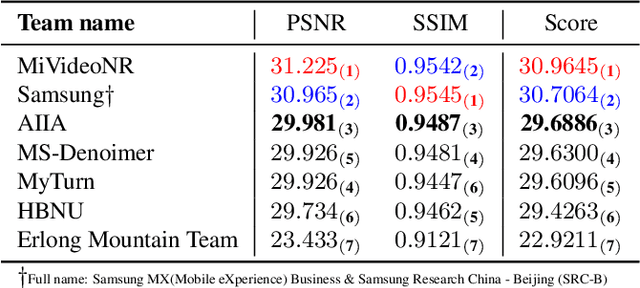
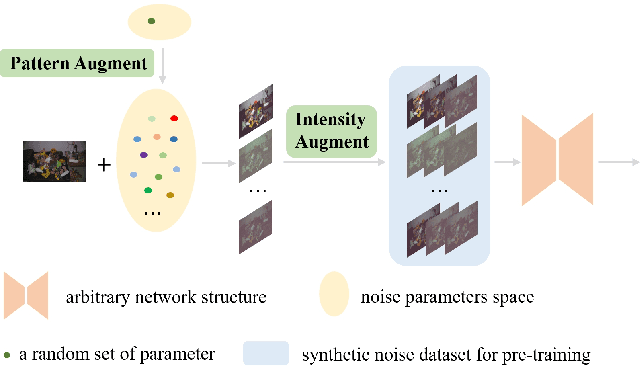


Abstract:The increasing demand for computational photography and imaging on mobile platforms has led to the widespread development and integration of advanced image sensors with novel algorithms in camera systems. However, the scarcity of high-quality data for research and the rare opportunity for in-depth exchange of views from industry and academia constrain the development of mobile intelligent photography and imaging (MIPI). Building on the achievements of the previous MIPI Workshops held at ECCV 2022 and CVPR 2023, we introduce our third MIPI challenge including three tracks focusing on novel image sensors and imaging algorithms. In this paper, we summarize and review the Few-shot RAW Image Denoising track on MIPI 2024. In total, 165 participants were successfully registered, and 7 teams submitted results in the final testing phase. The developed solutions in this challenge achieved state-of-the-art erformance on Few-shot RAW Image Denoising. More details of this challenge and the link to the dataset can be found at https://mipichallenge.org/MIPI2024.
Deep CNN Denoiser and Multi-layer Neighbor Component Embedding for Face Hallucination
Jun 28, 2018

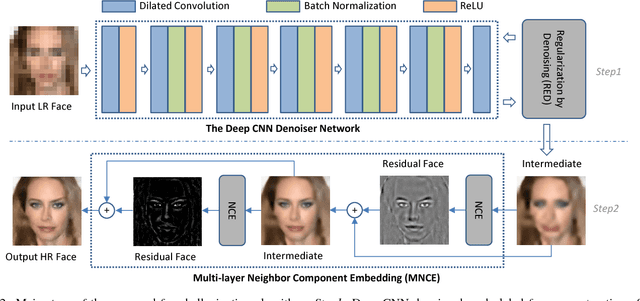
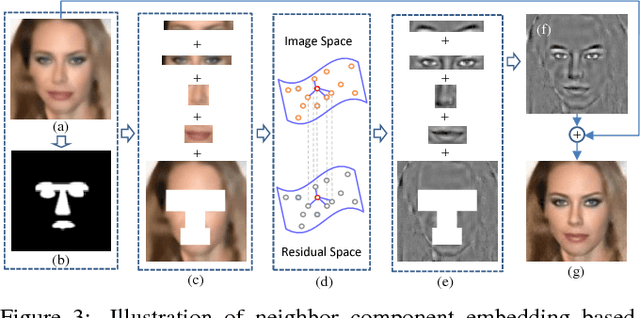
Abstract:Most of the current face hallucination methods, whether they are shallow learning-based or deep learning-based, all try to learn a relationship model between Low-Resolution (LR) and High-Resolution (HR) spaces with the help of a training set. They mainly focus on modeling image prior through either model-based optimization or discriminative inference learning. However, when the input LR face is tiny, the learned prior knowledge is no longer effective and their performance will drop sharply. To solve this problem, in this paper we propose a general face hallucination method that can integrate model-based optimization and discriminative inference. In particular, to exploit the model based prior, the Deep Convolutional Neural Networks (CNN) denoiser prior is plugged into the super-resolution optimization model with the aid of image-adaptive Laplacian regularization. Additionally, we further develop a high-frequency details compensation method by dividing the face image to facial components and performing face hallucination in a multi-layer neighbor embedding manner. Experiments demonstrate that the proposed method can achieve promising super-resolution results for tiny input LR faces.
 Add to Chrome
Add to Chrome Add to Firefox
Add to Firefox Add to Edge
Add to Edge